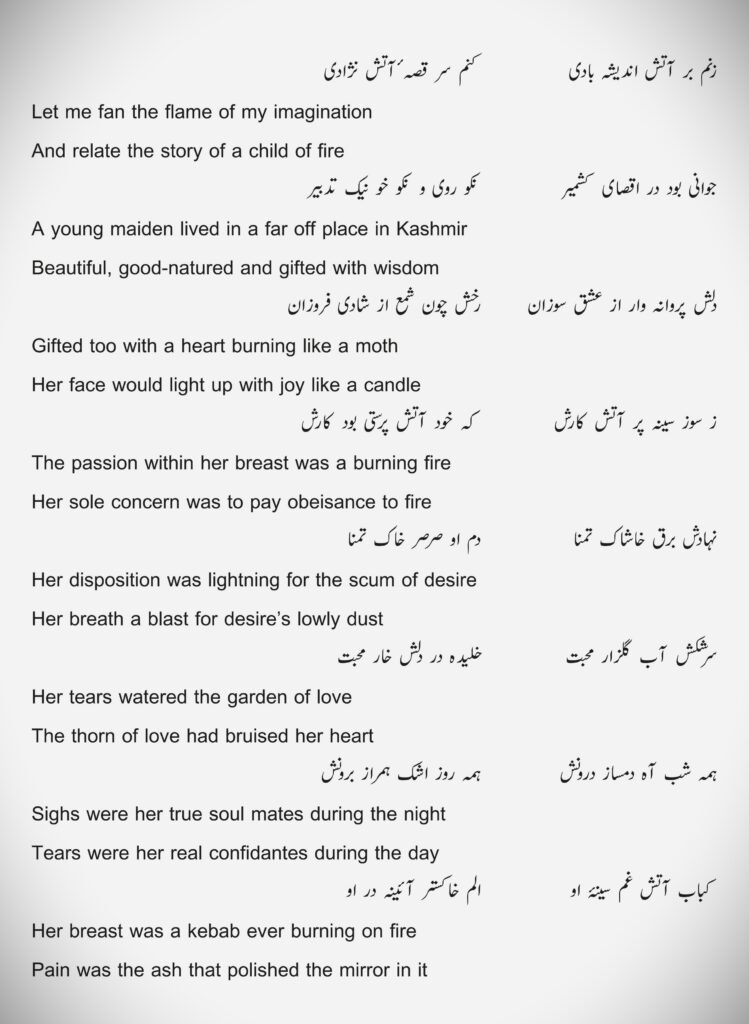( By: Kanwal Krishan Lidhoo)*
Continuing the tradition of according glory to Persian, the court language of the Mughals in the Indian subcontinent, Kashmiri Pandits have produced marvelous literature in this language, demonstrating their ability to add significance to anything close to their hearts. While Sanskrit was the language traditionally associated with this community, they had no qualms in accepting Persian, showcasing their mastery of this language and further demonstrating their capabilities as writers, poets, and historians. Their adeptness in learning the Persian language resulted in the creation of marvelous “Masnavis” in the tradition of classical Persian poets. Indeed, besides their grand works of literature, works by Kashmiri Pandits are also important sources of history and reflect the thought process of the times they lived in. Through their writings, they provide invaluable insights into the socio-cultural, political and intellectual landscape of their era. Their historical accounts, philosophical treatises, and reflections on society offer a window into the past, helping us understand the events, ideas, and values that shaped the world around them thereby making the works as indispensable sources for historians, researchers, and anyone interested in exploring the complexities of human experience.


Depiction of Sati incident in Kashmir
We are indebted to Rafi Ahmad Masoodi, Educationist, Academician and History Enthusiast who has prompted us at Kashmir Rechords to present a blog for our esteemed readers about the importance of a very valuable Masvani poem titled “Sati Namah” by Pandit Birbal Kachru (1795-1865) born to Daya Ram Kachroo “Khushdil” of Kralyar Rainawari, Srinagar. Essentially part of a historical document titled “Majmu-al Tawareekh. (Collection of Histories), “Sati Namah,” with its depiction of an actual incident in Kashmir during the 1831 period, which the poet blended with his own imagination offers valuable insights into the cultural and historical fabric of the region. Mufti Mudasir, a brilliant and erudite scholar of both English and Persian from Kashmir has translated this Persian Masnavi into English. This aesthetically brilliant and enriched poem found place in the peer-reviewed journal of English literature and Language published by University of Kashmir Srinagar (P-177, ISSN 0975-6574, Vol. 29, Dec.2022).


Alternatively Pt Birbal Kachroo’s pen name was “Vaarastah” (Related or connected to). It adds an intriguing layer of meaning to his identity as a writer connected to his community and heritage. It’s indeed a commendable endeavor to present this important Masnavi as part of Kashmir’s glorious history, and it is hoped that the same will be appreciated by many who are interested in the cultural and literary heritage of the region.
Here we have included some of the pages of the brilliant translation of Pt Birbal Kachrus’s “Sati Namah” by Mufti Mudasir.
- * Kanwal Krishan Lidhoo, an accredited translator of Kashmiri, Urdu and Hindi by Sahitya Akademi New Delhi and Indian Institute of Languages Mysore, has remained associated with the institution of All India Radio (AIR) where he worked as Senior most Producer. His books of Translation include “Samay Matrika” , the translation of 10th century Sanskrit classic of the same name by Acharya Ksemendra of Kashmir, Sahitya Akademi New Delhi’s “Hum Kaal Sindhi Afsana Sombran” a Kashmiri translation of Hindi scripted “Samkaleen Hindi Kathayen”, and under publication “Navi Yogikie Vaaeris Dar” a Kashmiri translation of English scripted collection of Punjabi short stories of renowned Punjabi short story writer Mohinder Singh Sarna, Indian Institute of Languages publication “Hindustaenie Falsafekie Khad-o-Khal”, the Kashmiri translation of “Outlines of Indian Philosophy” by world renowned Professor M.Hiriyanna besides a monograph on veteran and doyen of Kashmiri poetry, Makhan Lal Kanwal, (a Sahitya Academy Publication, Delhi)